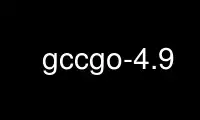
This is the command gccgo-4.9 that can be run in the OnWorks free hosting provider using one of our multiple free online workstations such as Ubuntu Online, Fedora Online, Windows online emulator or MAC OS online emulator
PROGRAM:
NAME
gccgo - A GCC-based compiler for the Go language
SYNOPSIS
gccgo [-c|-S]
[-g] [-pg] [-Olevel]
[-Idir...] [-Ldir...]
[-o outfile] infile...
Only the most useful options are listed here; see below for the remainder.
DESCRIPTION
The gccgo command is a frontend to gcc and supports many of the same options. This
manual only documents the options specific to gccgo.
The gccgo command may be used to compile Go source code into an object file, link a
collection of object files together, or do both in sequence.
Go source code is compiled as packages. A package consists of one or more Go source
files. All the files in a single package must be compiled together, by passing all the
files as arguments to gccgo. A single invocation of gccgo may only compile a single
package.
One Go package may "import" a different Go package. The imported package must have
already been compiled; gccgo will read the import data directly from the compiled package.
When this package is later linked, the compiled form of the package must be included in
the link command.
OPTIONS
-Idir
Specify a directory to use when searching for an import package at compile time.
-Ldir
When linking, specify a library search directory, as with gcc.
-fgo-pkgpath=string
Set the package path to use. This sets the value returned by the PkgPath method of
reflect.Type objects. It is also used for the names of globally visible symbols. The
argument to this option should normally be the string that will be used to import this
package after it has been installed; in other words, a pathname within the directories
specified by the -I option.
-fgo-prefix=string
An alternative to -fgo-pkgpath. The argument will be combined with the package name
from the source file to produce the package path. If -fgo-pkgpath is used,
-fgo-prefix will be ignored.
Go permits a single program to include more than one package with the same name in the
"package" clause in the source file, though obviously the two packages must be
imported using different pathnames. In order for this to work with gccgo, either
-fgo-pkgpath or -fgo-prefix must be specified when compiling a package.
Using either -fgo-pkgpath or -fgo-prefix disables the special treatment of the "main"
package and permits that package to be imported like any other.
-fgo-relative-import-path=dir
A relative import is an import that starts with ./ or ../. If this option is used,
gccgo will use dir as a prefix for the relative import when searching for it.
-frequire-return-statement
-fno-require-return-statement
By default gccgo will warn about functions which have one or more return parameters
but lack an explicit "return" statement. This warning may be disabled using
-fno-require-return-statement.
-fgo-check-divide-zero
Add explicit checks for division by zero. In Go a division (or modulos) by zero
causes a panic. On Unix systems this is detected in the runtime by catching the
"SIGFPE" signal. Some processors, such as PowerPC, do not generate a SIGFPE on
division by zero. Some runtimes do not generate a signal that can be caught. On
those systems, this option may be used. Or the checks may be removed via
-fno-go-check-divide-zero. This option is currently on by default, but in the future
may be off by default on systems that do not require it.
-fgo-check-divide-overflow
Add explicit checks for division overflow. For example, division overflow occurs when
computing "INT_MIN / -1". In Go this should be wrapped, to produce "INT_MIN". Some
processors, such as x86, generate a trap on division overflow. On those systems, this
option may be used. Or the checks may be removed via -fno-go-check-divide-overflow.
This option is currently on by default, but in the future may be off by default on
systems that do not require it.
Use gccgo-4.9 online using onworks.net services
